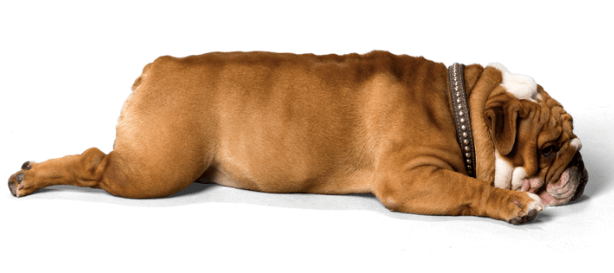Changes to the bulldog breed have caused health problems. Bulldogs have changed significantly over the years. According to William Lawlor author of the Blue Book of Bulldogs, the breed can be traced back to 1210 and were used for bullbaiting in England. Bullbaiting is an aggressive sport where bulldogs face off against bulls. At that time, bulldogs were bred to be tough and savage-like, very different from the bulldogs we think of today.

Once bullbaiting was banned in England in 1835, the breed was on the verge of extinction until the introduction of formal dog shows. Then, in 1860, breeders began to show Bulldogs for exhibitions and bred them for specific physical and temperamental characteristics. The first Bulldog Club was formed in 1864 and strove to improve the breed. In 1875, the Bulldog Club of England was established and still exists today and has kept its' mission consistent: to protect the breed.
By 1877, Bulldogs competed in the first Westminster Kennel Club show and by 1866, the breed received full recognition, which was "a hallmark of the devotion and ethical preservation of the Bulldog" (American Kennel Club). In 1955, the breed was selected as Westminster's best in show. Since then, bulldogs have evolved into the squishy, wrinkly, loving and cartoon-like characters with the best jowls, turkey legs and tongues out, that we think of today. However, changes to the bulldog breed have caused health problems.




The physical and temperamental changes made to the breed to make them so popular have occurred rapidly over the last few decades. In order to create this change and do so relatively quickly, breeders used a small pool of bulldogs with desired traits and bred them repeatedly. Unfortunately, this small pool, also referred to as a founder population, lacked genetic diversity, which is needed needed to keep the breed healthy. These changes to the bulldog breed have caused health problems.
Due to some in-breeding and this small founder-population, the same diseases are passed down through generations and bulldogs are notorious for sickness and disease. Most bulldogs can be traced back to the same grandparents or great grandparents, which represents this small founder population. Additionally, the entire genetic line of bulldogs have been over-medicated, over-vaccinated and largely fed a sub-optimal diet and typically born via c-section, which certainly doesn't promote health in any way.
According to the UK's Royal Veterinary College (RVC), English Bulldogs have a "high rate of health issues related to extreme body shape" and "exaggerated features" (Quad City Times), which is why some vets are urging people to not buy bulldogs at all. In a study completed by the RVC that compared the health of random samples of 2,662 English Bulldogs and 22,039 dogs of breeds, it found that bulldogs were "more than twice as likely to have one or more disorders in a single year than other breeds" (Quad City Times).
There are increasing pressures on breeders to alleviate some of these health issues. However, because the genetic diversity of bulldogs is so limited, improving the health of the breed might be very difficult. According to a 2016 study titled "A Genetic Assessment of the English Bulldog", "the breed has lost considerable genetic diversity through such things as small founder population and artificial genetic bottlenecks resulting from highly focused selection for specific desired physical traits." The same study also reports that genetically, the "narrowing of allele diversity in many parts of the genome, and for the create of numerous large regions of the genome that essentially identical within the breed, which are significantly different from other dogs." These changes to the bulldog breed have caused health problems.
Additionally, genetic diversity of the bulldog has been lost in many of the genes that regulate normal immune responses, which is why bulldogs are more prone to disease. This loss of genetic diversity and major changes to the bulldog genome will make it really difficult to improve the health of the breed with the existing gene pool. New mutations in terms of coat color, increased wrinkles and a more compact body size contribute further to a loss of genetic diversity. Even more unfortunate, the breathing problems that bulldogs are notorious for are "the result of complex changes in head structure, and cannot be corrected by merely lengthening the face."
While increasing the genetic diversity of the breed may be difficult, there are things you can do to make your bulldog healthier. You can feed a species-appropriate diet, which does not include kibble and vaccinate carefully so your bulldog has the best chance possible to live a happy and healthy life.
If you need more help on what to feed your dog, please click here. If you need more help on how/when to vaccinate your dog, click here. If your dog is sick and need some guidance on what to do, visit Bobzilla's Healthy & Happy Life Made Simple here.
Donate to Bobzilla.org

$5.00
The veterinary business is business which is not in the business of curing your animal, but Bobzilla's business is. Bobzilla is committed to one hundred percent transparency in all of its scientific research into animal wellness and prevention of disease and one… read more




